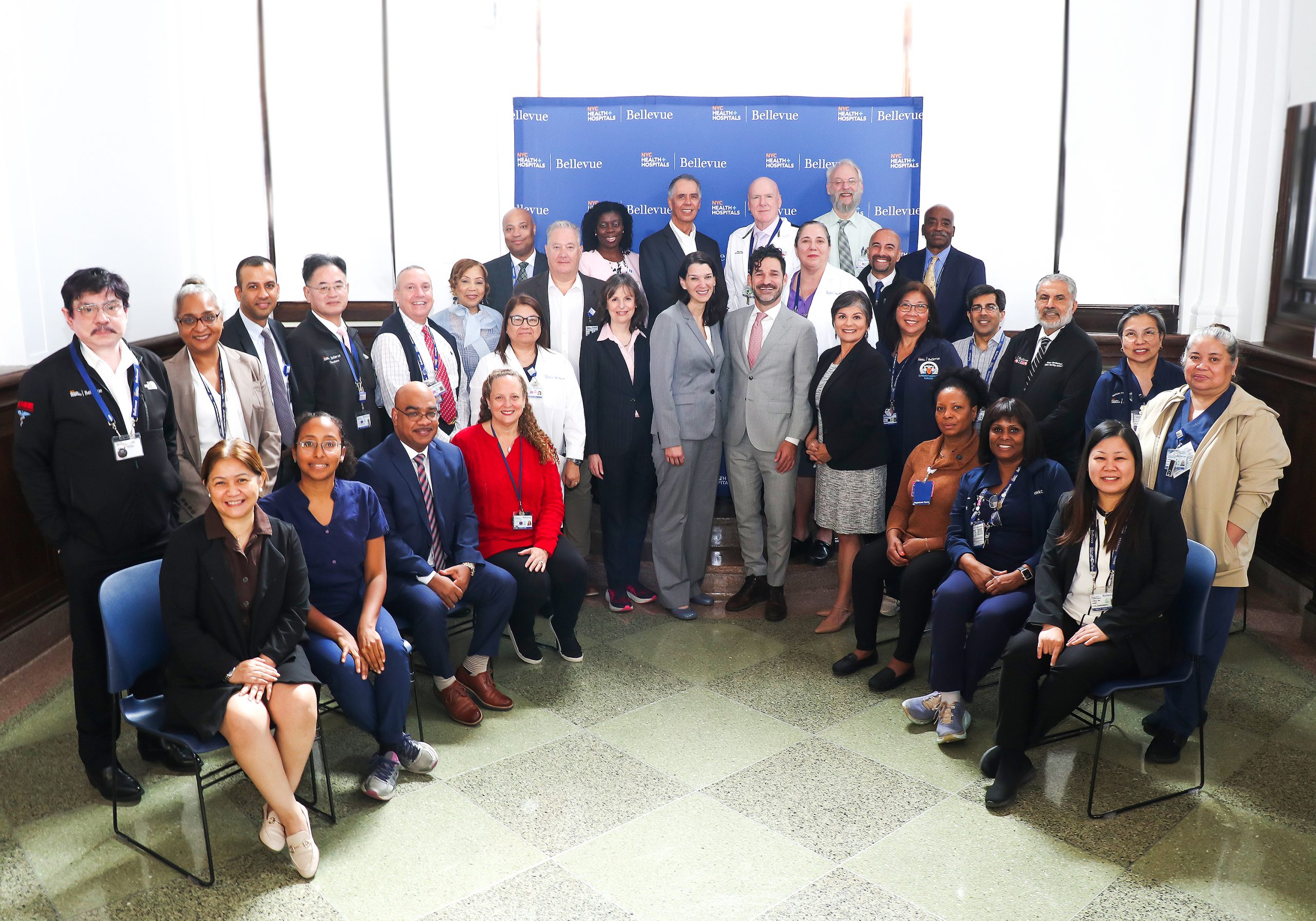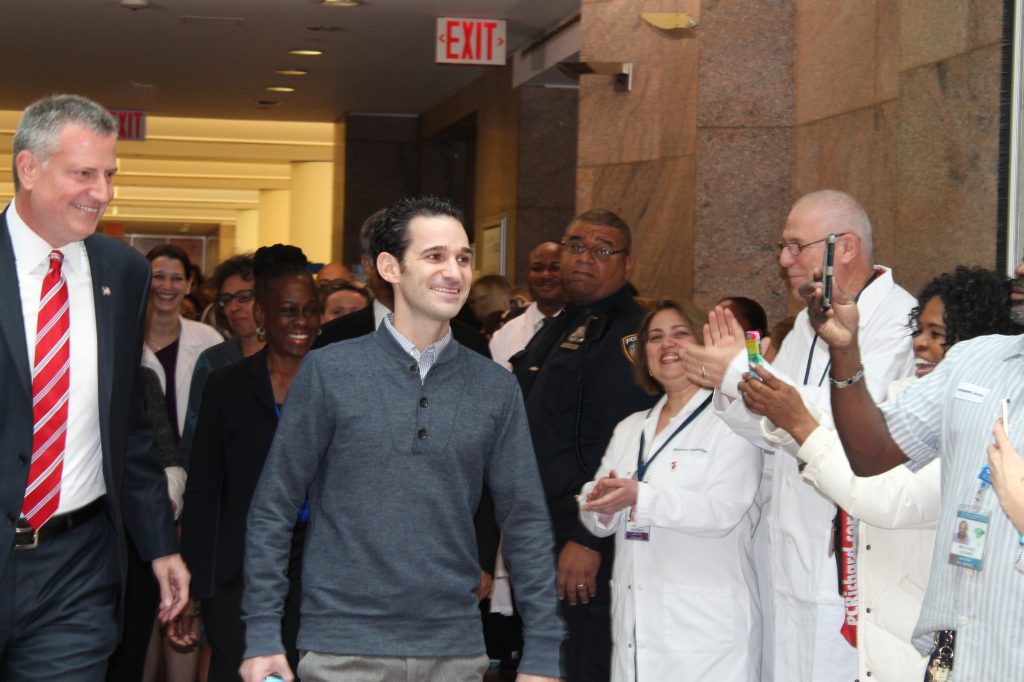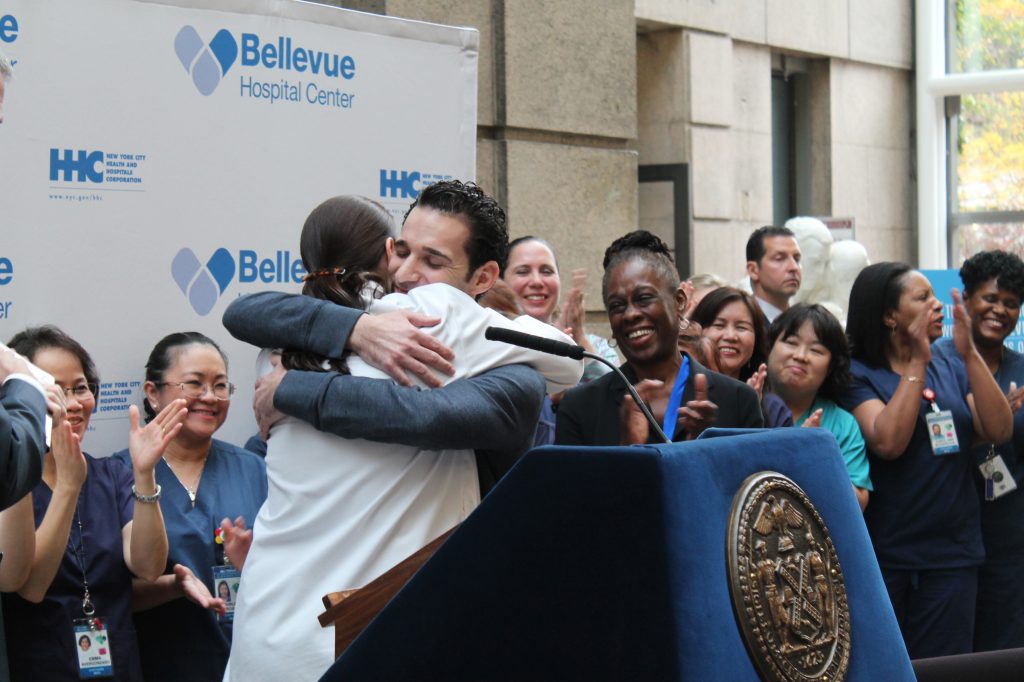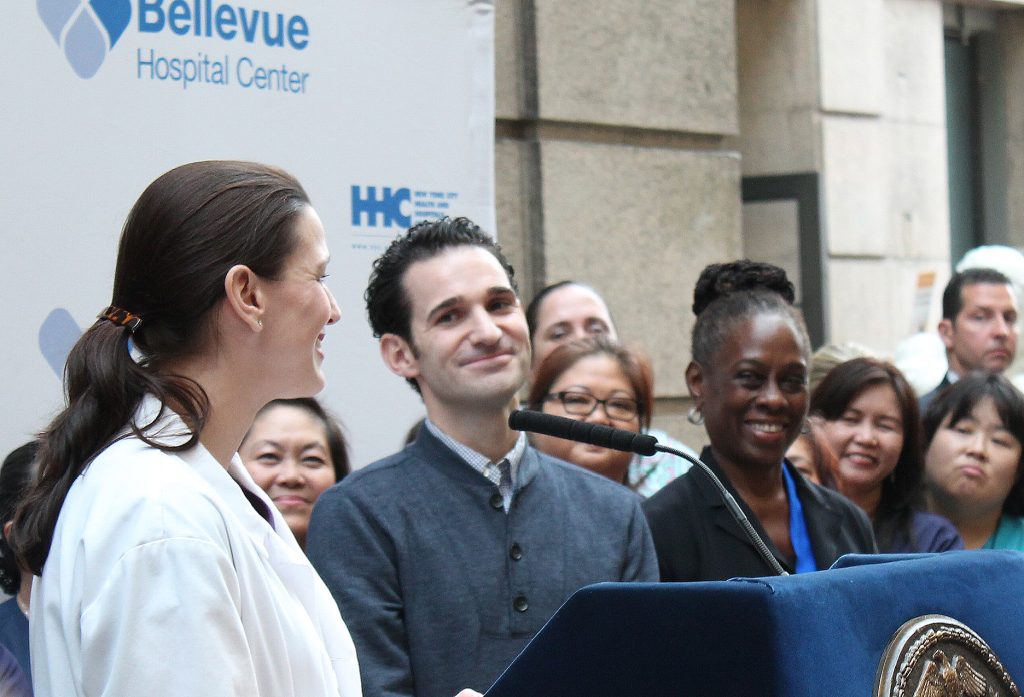NYC Health + Hospitals/Bellevue Hosts 10-Year Reunion of Healthcare Providers with Patient Who Recovered from Ebola
Special pathogens experts from NYC and Washington, DC observe a decade of resilience, equitable patient care
Oct 24, 2024

New York, NY — NYC Health + Hospitals/Bellevue today hosted an emotional reunion with Dr. Craig Spencer and the medical team who cared for him when he was hospitalized with Ebola 10 years ago this month, remembering the tense time during Spencer’s 19-day hospitalization and discussing ongoing preparedness and response strategies as special pathogens continue to emerge around the world.
At the event, A Decade of Resilience: Honoring the Ten-Year Anniversary of Ebola Treatment in New York City, special pathogens experts from New York and Washington, DC discussed lessons learned and the evolution of special pathogens training and preparedness in the decade since the Ebola outbreak was a national and international emergency.
Dr. Spencer recovered and today he is an Associate Professor of Public Health and Emergency Medicine at Brown University and an advocate for equitable patient care. “A decade ago, at one of the most difficult moments of my life, I was lucky to land at Bellevue,” said Dr. Spencer. “A team of remarkably dedicated professionals took care of me, treated me like family, and helped carry me through 19 days in isolation. They put their own safety on the line every day to bring me food, laugh with me, and make me feel less alone. Only days prior, I had returned from the frontlines of the Ebola outbreak in Guinea, where I had tried to do the same for the patients I had taken care of. I was grateful that all these providers at Bellevue were there for me. And almost every day since, I’ve wished similar resources existed for the people I took care of in West Africa.”
In a heartwarming moment during the reunion, Dr. Spencer hugged and thanked the nurses and other members of the care team, many of whom continue to work at Bellevue Hospital.

“In 2014, Bellevue was called to action to provide care for a highly contagious, and deadly disease mostly unknown in the United States,” said Marcia Peters, Chief Operating Officer at NYC Health + Hospitals/Bellevue. “We developed protocols and policies, and created a dedicated clinical space to treat patients. Our Ebola planning brought out the best in Bellevue. It made us realize how talented, how flexible, and how compassionate our team was. This experience has shaped our ability to respond to COVID and mpox and our current preparedness to treat high-consequence infectious diseases. Our common goal in 2014 remains the same in 2024: to treat patients safely and humanely while protecting our staff and community.”
“Bellevue’s legacy as a leader in the treatment of infectious diseases goes back to its earliest days, almost 300 years ago,” said Dr. Vikram Mukherjee, Director of the Special Pathogens Program and Director of Critical Care Services at NYC Health + Hospitals/Bellevue. “As the only biocontainment unit in New York City, we have the responsibility to treat and to educate our staff and our peers, and to provide our patients with the best possible care. As we have seen in the past decades, threats from high-consequence infectious diseases continue to grow. We are proud of our staff for leading the way for local, regional, and national preparedness.”

“In keeping with Bellevue’s mission of never turning anyone away, our doors are open to any patient with any disease at any time,” said Patricia Ann Tennill, RN, Nurse Lead of the Special Pathogens Program at NYC Health + Hospitals/Bellevue and part of the team that cared for Dr. Spencer. “Our program teaches healthcare professionals how to prepare themselves and their hospitals to safely care for a patient with a high-consequence infectious disease.”
“Bellevue’s leadership in special pathogens preparedness has been at the forefront of innovation for a decade,” said Syra Madad, DHSc, MSc, MCP, CHEP, Chief Biopreparedness Officer for NYC Health + Hospitals. “From pioneering biocontainment units to advancing training protocols, their work continues to set the national standard. Our close collaboration between NYC Health + Hospitals/Bellevue’s Special Pathogens Program and the NYC Health + Hospitals System-wide Special Pathogens Program has amplified these innovations across the largest municipal healthcare system in the country.”
Dr. Spencer was the only confirmed Ebola patient in NYC. He had returned from treating Ebola patients in Guinea on a tour with Médecins Sans Frontières (Doctors Without Borders) when he fell ill. He was admitted to Bellevue Hospital on October 23, 2014 and was treated by a specially-trained team of experts and intensive care nurses. He left 19 days later, on November 11, 2014, when doctors declared that he was healthy and able to be discharged from the hospital. None of the staff treating him became infected, a meaningful accomplishment as healthcare workers in other parts of the country and in West Africa had become ill.

Bellevue Hospital has centuries of clinical expertise built upon a history of experience responding to special pathogens and infectious diseases, from treating Yellow Fever, Spanish flu and tuberculosis to HIV/AIDS. During the 2014 epidemic, Ebola infected more than 14,000 people in West Africa and killed more than 5,000, according to news reports at the time. In New York, Bellevue was designated as the hospital with the expertise and capacity to care for a patient with Ebola. Over more than a year starting in July 2014, the hospital isolated and evaluated more than 20 patients under investigation for Ebola, triggering a strict set of practices and procedures including the use of personal protective equipment (PPE) by staff and isolation of patients in a hospital unit that had been specifically equipped to treat patients suspected of having Ebola. Hundreds of other patients were seen in the Emergency Department because of concerns they had the disease, but were quickly ruled out.
After the 2014 Ebola outbreak, medical, science and government institutions moved to strengthen preparedness for treatment of special pathogens, leading to the creation of the NYC Health + Hospitals/Bellevue Special Pathogens Program. The Special Pathogens Program includes a team of dedicated clinicians and support staff who care for patients who are suspected of or confirmed with high-consequence infectious diseases. These diseases, which have the potential to cause a high mortality rate among otherwise healthy people, include Ebola, Crimean Congo hemorrhagic fever, highly pathogenic avian influenza, and pneumonic plague. The Special Pathogens Program team cares for these patients in a specialized biocontainment unit while also managing Category A waste and assuring the safety of healthcare personnel.
Due to Bellevue Hospital’s role leading the Ebola response, it was one of three institutions selected to form the National Emerging Special Pathogens Training and Education Center (NETEC), a consortium to enhance national special pathogen preparedness. The hospital is also one of the original Regional Emerging Special Pathogen Treatment Centers (RESPTC), of which now there are 13 around the country.
Bellevue Hospital, in close coordination with the NYC Department of Health, NETEC and the U.S. Department of Health and Human Services Administration for Strategic Preparedness and Response (ASPR), serves as the Special Pathogen Preparedness Hub for the New York, New Jersey, Puerto Rico and the U.S. Virgin Islands.
A Decade of Resilience: Honoring the Ten-Year Anniversary of Ebola Treatment in New York City
At the 10-year reunion event at Bellevue, Maj. Gen. (retired) Paul Friedrichs, Director, White House Office of Pandemic Preparedness and Response, delivered the keynote address. Panel topics were: Bellevue’s Journey from Resilience to Innovation, Perspectives on Equitable Special Pathogen Patient Care, and From 2014 to Today: Evolution of Special Pathogen Preparedness and Response Strategies.
Speakers and panelists included:
- Dr. Craig Spencer, Associate Professor, Public Health and Emergency Medicine, Brown University
- Major General (Ret.) Dr. Paul Friedrichs, Director, White House Office of Pandemic Preparedness and Response
- Dr. James McDonald, Commissioner, New York State Department of Health
- Dr. Celia Quinn, Deputy Commissioner for Disease Control, NYC Department of Health and Mental Hygiene
- Dr. Laura Evans, Medical Director of Critical Care, University of Washington Medical Center
- Mr. William Hicks, MS, RT, DHL Chief Executive Officer, NYC Health + Hospitals/Bellevue
- Ms. Marcia Peters, JD, DHL, Chief Operating Officer, NYC Health + Hospitals/Bellevue
- Dr. Vikram Mukherjee, Director, Special Pathogens Program, NYC Health + Hospitals/Bellevue
- Dr. Andrew Wallach, Clinical Director, Ambulatory Care, NYC Health + Hospitals/Bellevue
- Patricia Ann Tennill, RN, Nurse Lead, Special Pathogens Program, NYC Health + Hospitals/Bellevue
- Dr. Syra Madad, Chief Biopreparedness Officer, NYC Health + Hospitals
- Dr. Mary Foote, Medical Director, NYC Department of Health and Mental Hygiene
- Dr. Nahid Bhadelia, Center on Emerging Infectious Diseases, Boston University
- Joseph Palm, Regional Director for HHS Region 2.
- Dr. Rick Hunt (ASPR), Senior Medical Advisor, Office of Health Care Readiness, ASPR
- Dr. John Lowe (NETEC); Director, Global Center of Health Security, University of Nebraska Medical Center
- Dr. Aneesh Mehta (NETEC), Professor of Infectious Diseases, Emory University Hospital
- Dr. Bryan Christensen (CDC), Associate Director for Preparedness and Response, DHQP
###
#175-24
MEDIA CONTACT: 212-562-4516; BellevuePublicRelations@nychhc.org
About NYC Health + Hospitals/Bellevue
NYC Health + Hospitals/Bellevue is America’s oldest public hospital, established in 1736. Affiliated with the NYU Grossman School of Medicine, the 851-bed hospital is a major referral center for highly complex cases, with 6,000 employees including highly skilled, interdisciplinary clinical staff. The hospital is a Level 1 Trauma Center and annually it sees about 103,000 emergency room visits, and more than 520,000 outpatient visits. Clinical centers of excellence include: Emergency Medicine and Trauma Care; Cardiovascular Services; Bariatric Surgery; Designated Regional Perinatal Center and Neonatal Intensive Care Unit; Children’s Comprehensive Psychiatric Emergency Program; and Cancer Services. For more information, visit www.nychealthandhospitals.org/bellevue and follow us on Facebook and X (Twitter).
About NYC Health + Hospitals
NYC Health + Hospitals is the largest public health care system in the nation serving more than a million New Yorkers annually in more than 70 patient care locations across the city’s five boroughs. A robust network of outpatient, neighborhood-based primary and specialty care centers anchors care coordination with the system’s trauma centers, nursing homes, post-acute care centers, home care agency, and MetroPlus health plan—all supported by 11 essential hospitals. Its diverse workforce of more than 43,000 employees is uniquely focused on empowering New Yorkers, without exception, to live the healthiest life possible. For more information, visit www.nychealthandhospitals.org and stay connected on Facebook, Twitter, Instagram and LinkedIn.
